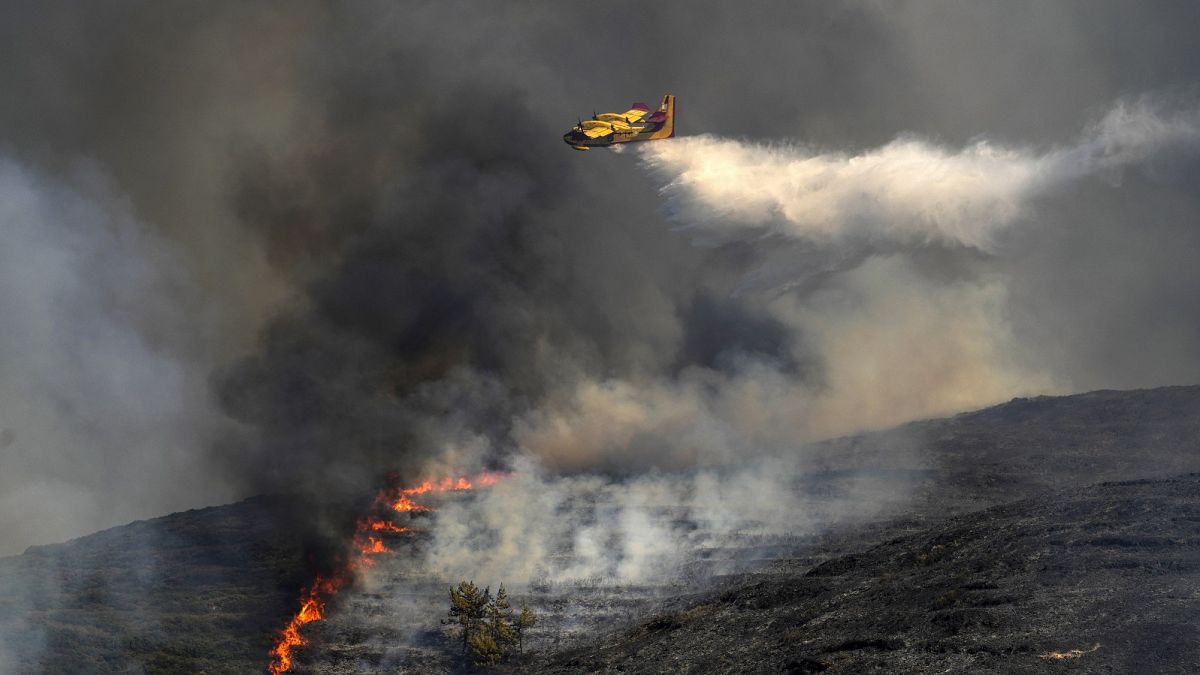The European Commission has announced it will purchase 12 new planes to increase the capacity of its aerial firefighting fleet as southern European nations fight blazes.
The 12 sought-after ‘Canadair’ aircraft will be wholly financed by the EU but stationed in and legally owned by Croatia, France, Greece, Italy, Portugal and Spain.
“We have recently achieved a breakthrough with a potential producer of the most sought-after Canadairs to resume global production again,” European Commissioner for Crisis Management Janez Lenarčič told Euronews.
“We will be able to further boost the rescEU firefighting air fleet (...) in order to respond to such intense fires which are becoming a new normal,” he added.
Pilots for the new aircraft will be provided by the six member states, while the EU will finance the other staff needed to ensure their availability and deployment.
These new planes won't, however, be available until the 2027 forest fire season.
This comes as wildfires rage across the Mediterranean and Northern Africa, forcing thousands to evacuate their homes and killing at least 40.
This month, Greece and Tunisia have both activated the EU Civil Protection Mechanism, which allows countries to request assistance from other nations to fight fires. Over 490 firefighters and nine firefighting planes have been deployed to Greece and Tunisia since 18 July.
Although stationed in the six southern member states, the 12 new planes will also be available to countries activating the Civil Protection Mechanism with the European Commission holding the final decision on deploying the fleet in response to crises.
Over 180,638 hectares of EU land have burned so far this year due to fires, 29% more than the 20-year annual average. In Greece, the area burned this year is a staggering 83% above average.
The EU already doubled its reserve aerial firefighting fleet last year in preparation for this summer.
Lenarčič explained that this was in response to an uptick in strong wildfires in Europe that were “threatening many member states simultaneously, and hence stretching their ability to help each other through the ad hoc expressions of solidarity that we coordinate through the EU Civil Protection Mechanism.”
"What is more, this year we continue with prepositioning of ground firefighting forces as to enable swift European assistance also on the ground," he added.
The European Commission said it is also taking measures to address the root causes of the upward trend in intense wildfires, which is fueled by climate change.
"We have prepared the Wildfire Prevention Action Plan with the objective to improve the administrative capacity and knowledge of stakeholders, and increase investments in wildfire prevention action," Lenarčič said.
But according to the Commissioner, tackling the root cause of climate change is essential. Extreme meteorological conditions have been shown to aggravate wildfires, with warmer and drier conditions leading to longer and more active fire seasons.
"The most effective response to limit the damage of such devastating natural impacts on lives, livelihoods and the environment as well as to prevent even worst from happening is the green transition," Lenarčič said.
While civil protection is a national competence, with the EU supporting by coordinating an efficient response, Lenarčič did not disregard the prospect of an EU-level firefighting service should the steep increase in wildfires persist.
"The probability of a scenario with fully-fledged EU firefighting service being followed through of course depends foremost on the member states themselves," he said.
"Regardless of such developments, the Commission will continue to do its utmost to conduct its supportive competence in this area."
